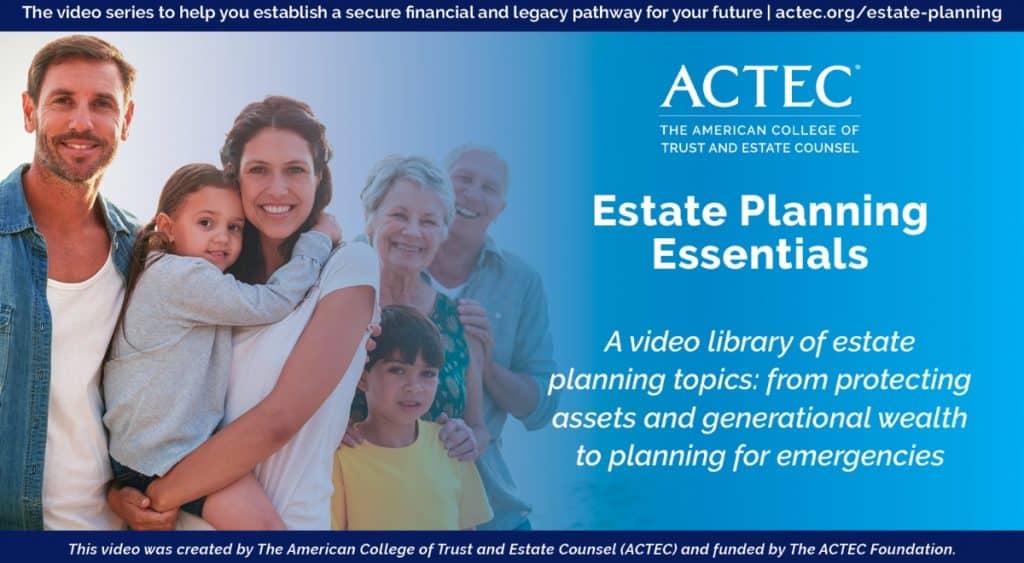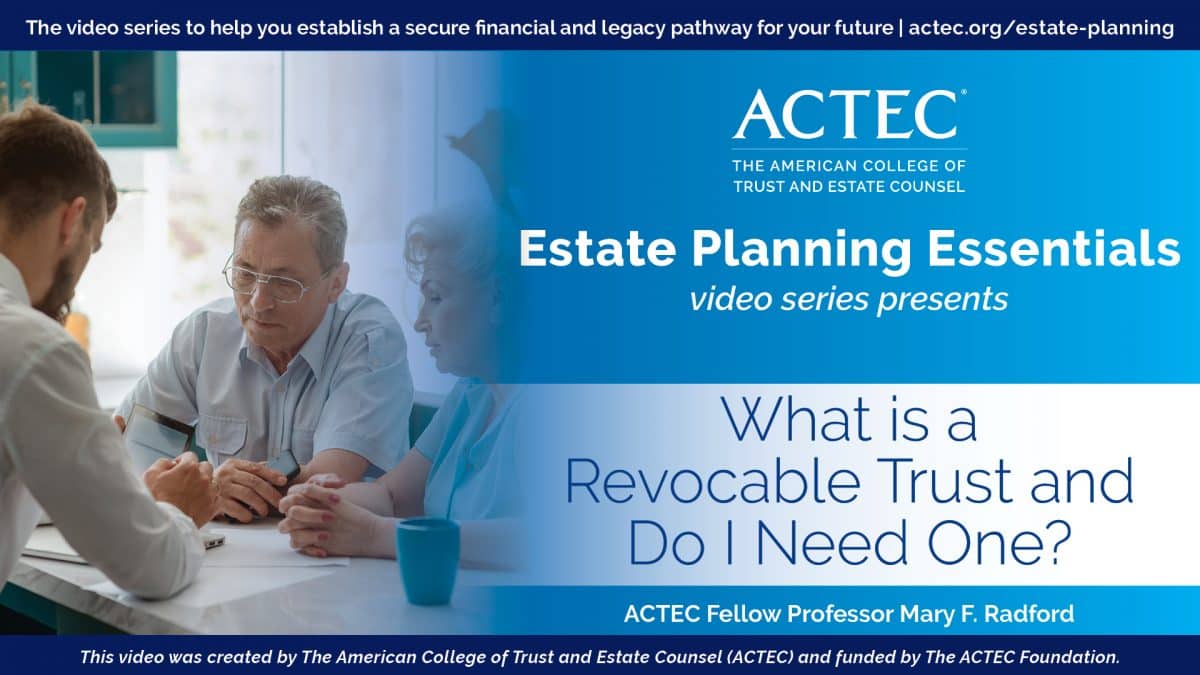Funding your trust is crucial because it ensures that the assets you want to pass on to your beneficiaries are properly transferred and managed according to your wishes. Adequate funding safeguards against probate and legal challenges, streamlining the distribution process and potentially minimizing tax implications.
ACTEC Fellows Elizabeth A. Garlovsky and Shaina Kamen explain the importance of transferring assets into the name of your trust, so you may provide asset protection for your loved ones while maintaining control over the legacy you’ve built.
Transcript
I’m Shaina Kamen, an ACTEC Fellow from New York City, and I am here with ACTEC Fellow Elizabeth Garlovsky of Chicago, Illinois, and we’re here to talk about what to do after you’ve signed your revocable trust. Lizzy, thanks so much for joining us today.
Now that you’ve taken the steps to create a revocable trust, what are some additional steps you should take to make sure that your estate planning goals are fulfilled?
Funding a Trust
Elizabeth Garlovsky: Thanks, Shayna, and thank you for having me today as well. The first thing you should do is to make sure that you follow the instructions from your attorney on how to fund your trust.
Shaina Kamen: What does it mean to fund your trust, Lizzy?
Elizabeth Garlovsky: Great question. So funding your trust refers to the process of retitling your personal assets so that your new trust is reflected as the owner. This does not affect your ability to access or use the assets as typically, the person who establishes the revocable trust is also the trustee and sole beneficiary.
Funding your trust will ensure that your assets will pass according to your wishes and, barring any unexpected circumstances, without the need for probate court. This also applies if you become disabled. Assets titled in a revocable trust can be managed seamlessly by your successor trustee without the need to ask the court to appoint a guardian or conservator.
Shaina Kamen: So, what assets would you typically use to fund your revocable trust?
Elizabeth Garlovsky: So, typically, we fund the revocable trust with checking, savings, brokerage accounts, stocks, bonds, personally titled real estate, closely held investments. It really can be almost anything that’s otherwise held in your personal name.
In some states, your attorney may also advise signing a blanket assignment of your tangible personal property, so your “stuff” as well, to cover property that typically has no title behind it other than sometimes a bill of sale or receipt for purchase.
I think it’s important to keep in mind when we’re talking about real estate and funding your trust with real estate, always make sure that you’re actually the owner. And it’s a great time to check your deeds or public record; do a public record search as necessary.
Shaina Kamen: That’s a really good point, Lizzy. Sometimes, when we have clients that go to move real estate into the trust, we definitely see issues with titling. And maybe the prior deed wasn’t recorded properly, or maybe somebody had passed away and their name is still on the deed, so it’s a really good point that you’ve just made.
Do You Need an Attorney to Fund A Revocable Trust?
Lizzy, could you tell me: Do you actually need an attorney to help you fund your revocable trust?
Elizabeth Garlovsky: So yes and no, or yes or no. Some attorneys will provide instructions for you, and you can do most of it yourself. However, it can be really helpful to keep your attorney involved during the process to make sure that documents are signed and executed properly and recorded or filed as needed, depending on your jurisdiction.
The Trust Agreement
Shaina Kamen: So that brings me to the next question. What do I do with the actual trust agreement after I leave the attorney’s office?
Elizabeth Garlovsky: Sure. So some attorneys will offer to hold on to the original document for you; other attorneys will give the original document back to you to hold for safekeeping and then keep only a copy.
If you do take the original from your attorney, you should put it in a safe place where at least one other person can access it and who also knows about it. It is not always advisable to use a safe deposit or a lockbox at a bank because, unless someone else has the key, it may take time and the court’s involvement to get the box open.
We do advise using a small safe or perhaps a drawer in your home office that might have a lock, and you can provide your successor trustee with the combination or the key or with instructions on where to find it.
You can also give your successor trustee or other family members copies of the trust if you are comfortable, while you’re alive.
Managing the Estate Plan
Shaina Kamen: Great! So finally, after the estate plan is buttoned up, the trust is funded, and it’s put in a safe place, when is the next time that you should think about updating or reviewing the estate plan?
Elizabeth Garlovsky: This is a great question. So, unfortunately, revocable trusts are not “set it and forget it,” and my rule of thumb is that you should always review the document on average every five years, but sooner if there are changes in your family or financial situation—for example, if you inherit a large sum of money or win the lottery, or if perhaps the person you named to act as successor trustee dies or becomes incapacitated.
There are many other reasons why you should review your trust, including the possibility that laws may change that require you to make some tweaks. Some attorneys will proactively inform you of changes that would affect your trust, but this is not a fail-safe option, and you should ideally be proactive as the person who established the trust and request a periodic review.
Shaina Kamen: Great point. Thanks again, Lizzy, for joining us today and for sharing your thoughts on this topic.
Elizabeth Garlovsky: Thank you for having me.
Featured Video
What is a Revocable Trust and Do I Need One?
A revocable trust is a flexible estate planning tool that avoids probate. Learn why you may need it for privacy, asset management, and to avoid probate.
ACTEC Estate Planning Essentials

ACTEC Fellows provide answers to frequently asked trust and estate planning questions in this video series.



